Peter MALONE
Saturday, 18 September 2021 19:28
Trilogy of Terror
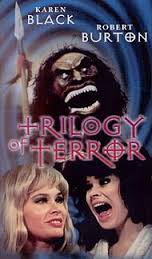
TRILOGY OF TERROR
US, 1975, 72 minutes, Colour.
Karen Black, Robert Burton, Gregory Harrison.
Directed by Dan Curtis.
Quite an entertaining telemovie. It has three stories - they are of mixed value. The film is definitely a showcase
e for its main star. Karen Black. She emerged during the seventies as a frequently seen actress and one with a great range of acting abilities. She could perform dramatically in such films as Day of the Locust and sing in films like Nashville. She has appeared in a mixture of popular entertainments as well as serious films.
The stories in this film are based on stories by prolific writer Richard Matheson. He has written many horror stories and adapted stories by Poe for Roger Corman and Bram Stoker for director Dan Curtis. He wrote the screen play only for the last segment, Amelia. It is definitely the most successful. Karen Black appeared in The Strange Possession of Mrs Oliver, a story by Matheson, directed by Gordon Hessler. Karen Black worked under the direction of Dan Curtis in Burnt Offerings. Curtis has made many horror movies, especially the Dark Shadows series.
1. An entertaining telemovie - the three stories? Karen Black's performances? The showcase for her? Audience enjoyment of horror stories? The placing together of these three stories?
2. The quality of the screenplay? the conventional material of the stories - how originally presented? Within a short space of time? For the one actress to communicate the themes, drama, situations, horror?
3. The special effects - colour photography, American locations? The contrast of the two women in the second story? The special effects with the doll in the third story?
4. The appeal of horror stories? The tone of the title? Victims of horror? The mysterious? Evil and its possession of people? The suspension of disbelief?
5. Karen Black's range of performances in the three stories? The qualities of her acting? Style?
6. Julie: The teacher and her prim manner, her friend and her worry? The two young students and the preoccupation with sex? The background of American literature and violence? Chad's proposal and going to the drive-in, the horror movies, the fear and the fainting on Julie’s part, his drugging her, the photography? His blackmailing her with the photos? The affair and the seeming effect on Julie? Her sudden turning against Chad? Killing him? Her scrapbook? The new student and the process starting again? How expected was the solution? How credible?
7. Millicent and Therese: The contrast of the two sisters? How evident was this a study of personality split? Millicent and her primness, her tongue lashing of Therese’s suitor, the focus on the occult, her writing the diary and the record of Therese’s behaviour, the phone call to the doctor? Millicent being locked in the room? Her later kindness to the little girl? The contrast with Therese's appearance, slatternly behaviour? The attempt at seduction of the doctor? The suitor and his being abused? The doctor and his reaction to Therese’s behaviour? The hatred of the two sisters? Millicent's plan to kill Therese? The doll and the occult? Therese's death and the discovery of Millicent? The doctor's final comments? How evident was this a story of split personality? What light did it throw on the theme? The melodramatics of the surface personality suppressing the licentious personality underneath? The American style of personality split: surface and depth?
8. Amelia: Amelia and her talking to her mother, the fact that she was the only character appearing? The first impressions of the doll? The ordinariness of the situation? The sudden coming alive of, the doll? The details of the pursuit? The equivalent humanity of the doll? The crises, the terror, the noise, the visuals, the editing and pace, the subjective shots of Amelia being afraid? Drowning the doll, putting it in the box? Burning it in the oven? The irony of the take-over and Amelia waiting for her mother an the doll? The point of personality take-over in this story?
9. How entertaining a film? The equivalent of Nightmares? Insight into the problems of personality through horror and nightmares?
Published in Movie Reviews
Published in
Movie Reviews
Tagged under
Saturday, 18 September 2021 19:28
Tribes
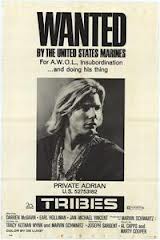
TRIBES
US, 1970, 90 minutes, Colour.
Darren Mc Gavin, Earl Holliman, Jan- Michael Vincent.
Directed by Joseph Sargent.
Tribes was also known as The Soldier Who Declared Peace for its theatrical release. This telemovie was very topical in 1970. The protests against the war were very strong, President Nixon had bombed Cambodia, students had been gunned down at Kent State, the draft for Vietnam was in full swing and people were becoming disillusioned, especially because of television pictures of the war as well as the protests. The film played to a younger audience – in the aftermath of the hippies, long hair, flower power, and standing up to authority figures, especially when they were not credible.
Jan- Michael Vincent is the central character. He appeared in several of this kind of film during the 1960s and 1970s including Buster and Billie. The authorities are played by television regulars Darren Mc Gavin and Earl Holliman.
The film is interesting to look at in retrospect. It highlights attitudes at the end of the 60s and attitudes which were to come into play in the 1970s.
The film was directed by regular telemovie director Joseph Sargent who had a long career in films (The Taking of Pelham One Two Three) as well as many telemovies into the 21st century. The screenplay by Marvin Schwartz and Tracy Keenan Wynn won an Emmy award. It was Tracy Keenan Wynn’s first screenplay. He went on to write such interesting films as The Autobiography of Miss Jane Pitman, The Longest Yard, The Drowning Pool as well as the adaptation of Peter Benchley’s The Deep.
1. The quality of this telemovie? Award for its screenplay? Television style, commercial pauses etc.?
2. Its reflection of the atmosphere of 1970, attitudes towards the military in America, Vietnam? The presuppositions of the popular American audience at the time the television audience? How stirring would this film have been? Its impact now?
3. The significance of the title, the background of the song? The different tribes that Adrian and Drake represented? The overtones of the word ‘tribe’?
4. What was the basic message of this film? In an American context, human values? The challenging of established values especially by the military?
5. The film's focus on Adrian? His first presentation in the bus, his appearance, attitudes? The inspection of the new recruits and his place amongst them? The background of his being drafted? What kind of person was he in himself, his ability to fit in, reactions to people? His reaction to Drake? His being called ‘Lady'? De Payster and his hostility? The other recruits? How did he appear an a sign of contradiction?
6. His ability to cope with military life and training? His enthusiasm? His criticism? His use of meditation. remaining cheerful? Not taking things and routines too seriously? His basic loyalties?
7. The other recruits and their characterization, suspicion and hostility, support? Fear, humour? The recruit who slashed his wrists? The impact of training on them?
8. Drake as a sign of contradiction? His initial appearance and his presentation of himself as martinet? Yet seeing him relaxed, talking about fishing, his drawing? His dedication to his work and his belief in his style of training? The ways in which he was hard, soft and kind? His relenting in his confrontation with Adrian? The taunts of De Payster? The sequence of the rifle range and Adrian’s refusing to shoot? His pursuing him when he went off without leave and persuading him to come back?
9. The contrast of De Payster as the harsh military martinet, unimaginative, cruel? The comment on military attitudes via this character?
10. The film’s presentation of military style, orders, obedience, shouting etc? Audience response to this way of training? How human a way of training?
11. The shooting and the change in Adrian, his going away and yet returning?
12. His achievement, but the crisis of checking his motivation and returning him to camp? The clash between Drake and De Payster?
13. The film's informing the audience that Adrian had gone over the hill? The reactions of both men? The symbolism of the gull?
14. What is the audience left with after a film like this? A questioning of its values?
Published in Movie Reviews
Published in
Movie Reviews
Tagged under
Saturday, 18 September 2021 19:28
Tower of London
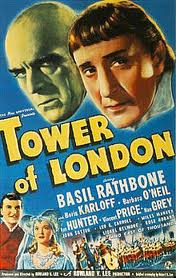
TOWER OF LONDON
US, 1939, 92 minutes, Black and white.
Basil Rathbone, Boris Karloff, Barbara O’ Neill, Ian Hunter, Vincent Price, Nan Grey, John Sutton, Leo G. Carroll.
Directed by Rowland V. Lee.
Audiences might be mistaken to think this is a horror film with Boris Karloff and Vincent Price in the cast. However, it is a historical drama focusing on Richard, the hunchback Duke of Gloucester who was to become Richard III. The film focuses on the material covered so effectively in Shakespeare’s Richard III. Laurence Olivier’s version of Richard III is the classic version – though Ian Mc Kellan made a very interesting version in the 1990s giving it a fascist 1930s setting.
Basil Rathbone, a splendid villain from many films of the 30s to the 50s, is the hunchbacked (slightly) Richard. At this stage he also appeared in The Adventures of Robin Hood as well as his Sherlock Holmes series. Boris Karloff has a small role as his assistant who assists him in eliminating the rivals to the throne including the two young princes in the tower as well as the Duke of Clarence (here played by Vincent Price – who was to be Richard in the 1960s remake of Tower of London).
The film is a psychological drama, focusing on the mind and ambitions of Richard. It shows his ruthlessness – and the final confrontation with Henry Tudor who was to defeat him at Bosworth Field and become Henry VII, father of Henry VIII.
The film was directed by Rowland V. Lee who began direction in 1920, made some significant films in the 1930s including the classic Count of Monte Cristo as well as a version of The Three Musketeers and The Son of Frankenstein. He also made The Bridge of San Luis Rey and Captain Kidd during the 1940s.
1. Was this an enjoyable film? As history, drama, Boris Karloff horror? Which aspect predominated?
2. How important were the 1930s film techniques: the sets, the costumes, the production values? The quality of the acting?
3. Why is the historical background of the War of the Roses so interesting to English speaking audiences? The Civil War background, the personalities involved, the historical background and understanding of human nature? Were these themes emphasised in the film?
4. How well did the film focus on Richard? His ambitions, a sinister character? Basil Rathbone’s performance, not so disfigured as other Richards, his ambitions and his tableau of statues, his removing his rivals, his devices for murder, his overreaching himself and his death? Was there insight into Richard in this characterisation?
5. How important was Boris Karloff’s executioner for the film? How horrifying? How real a character? The sensationalism of his cruelty?
6. The insight into Edward IV? As a weak king, as the crony of Richard, the importance of the execution scenes, his death?
7. The contrast with the Duke of Clarence, his weakness, his trusting Richard, his being out manoeuvred, the irony of his drinking and his death?
8. The portrayal of the Queen Dowager, her collaboration with Edward, her fear of Richard, the inevitability of the murder of her children in the tower?
9. Was Lady Anne an attractive character? Was her relationship with Richard convincing?
10. How well drawn were the minor characters and the people at court? The young man executed, his cousin? The quality of the intrigues at the court? The role of executions? The fleeing to France and to Henry Tudor?
11. How did the Tower of London serve as a symbol for the events of this film?' How successful was this as a historical movie compared with modern epics? Where are the differences? Are they important?
Published in Movie Reviews
Published in
Movie Reviews
Tagged under
Saturday, 18 September 2021 19:28
Touch of Larceny, A
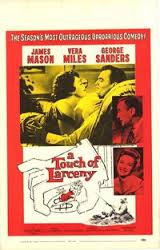
A TOUCH OF LARCENY
UK, 1959, 93 minutes, Black and white.
James Mason, George Sanders, Vera Miles, Robert Flemyng, Duncan Lamont, Harry Andrews.
Directed by Guy Hamilton.
A Touch of Larceny is a caper film – serious with a touch of humour. James Mason portrays a commander who has had a very successful career but is in need of finance. When he meets a young woman, Vera Miles, he begins a plan to fake his disappearance – and then return to sue for libel those who had attacked him. The film also stars George Sanders in the sardonic role of Sir Charles Holland.
The film is an enjoyable star vehicle for James Mason in a suave role. Vera Miles is always an attractive heroine in films of this period (next year she was to appear in Psycho).
The film was directed by Guy Hamilton who directed a number of small-budget British films in the 1950s as well as An Inspector Calls and The Colditz Story. During the 1960s he was to direct the James Bond film Goldfinger as well as the Len Deighton, Harry Palmer film Funeral in Berlin. Amongst his other credits were Battle of Britain and other Bond films, Diamonds Are Forever, Live and Let Die, The Man with the Golden Gun. He also directed the adaptations of Agatha Christie’s The Mirror Crack’d and Evil Under the Sun.
I. The indications of the title: irony, wit, style, humour? Did the film correspond to its title? How?
2. How successful a comedy was this? Humour and the light touch? Comedy of British manners? Comedy of crime, communicating of values?
3. How successful was the plan and its execution? Did the film prepare this well? Did it spend too much time building up to the plan and leaving its execution till a bit Late?
4. Where was audience sympathy meant to be? How sympathetic was Max from the start? Was his meeting with Charles and Virginia too contrived? His style too contrived? (Or did this prepare us for a man who would execute such a confidence trick plan?)
5. What kind of man was Max in himself? His war heroism and his national repute? His dissatisfaction with post-war desk work? His heroic and daring nature? His subtlety and flirting? His old-boy style with Charles? All his ploys to insinuate himself to Virginia? The daring of his plan? the execution of his plan? His enjoyment of his stay on their island? the irony of his being shipwrecked after all? His luck in having made an alliance with Virginia? The fact that her manoeuvred all difficulties and succeeded in the and? Were you sorry? Why?
6. How did Max react with Virginia? How did you learn about Max from Virginia? What kind of woman was she? How did she counter all Max’s ploys? Why did she find him attractive and charming? Why did she want to marry Charles? Why did they clash?
7. Was Charles a typical Briton or was he a caricature? His friendship with Max? His turning against him on behalf of honesty and patriotism?
8. How enjoyable were the deceits of Max’s plans at the Russian party, losing the book at the office, the Karl Marx at Liverpool? Why was this enjoyable? Did we want him to succeed?
9. How humorous a film was this about Britons? the types in the public service?
10. What comment on newspapers and their sensationalism did the film make? What they could be sued for Liability?
11. Were you glad that Charles was defeated? Why?
12. The film ended happily ever after. Was this fair and just? Why?
13. What did the film have to say about truth and values, honesty, subtlety and sincerity? Enjoying life?
Published in Movie Reviews
Published in
Movie Reviews
Tagged under
Saturday, 18 September 2021 19:28
Tortilla Flat

TORTILLA FLAT
US, 1942, 105 minutes, Black and white.
Spencer Tracy, John Garfield, Hedy Lamarr, Frank Morgan, Akim Tamiroff, Connie Gilchrist, John Qualen.
Directed by Victor Flemyng.
One of the several versions of Steinbeck novels made around 1940, for example Of Mice and Men, The Grapes of Wrath, The Moon is Down. Later versions include The Red Pony and East of Eden.
This is the world of central California, Monterey and the enclosed world of the Spanish- Americans and their descendants. It is the world to Steinbeck and liked so very much by him. It is a microcosm of the foibles of human nature.
Spencer Tracy, with an accent similar to that of Captains Courageous for which he won an Oscar in 1937, is the leader of the group. John Garfield has a strong pleasant heroic role and Hedy Lamarr is the attractive heroine. Frank Morgan is engaging as the crazed religious man. Direction is by Victor Fleming with whom Tracy worked on many films including Dr. Jekyll and Mr. Hyde and Captains Courageous. Of particular appeal to Steinbeck fans.
1. The appeal of John Steinbeck’s work? his vision of America, the locations and atmosphere of Monterey and the area around it, the sense of place, of the people, their particular values within the framework of their small world? A satisfying version of Steinbeck's work?
2. The M.G.M. production values of the forties, black and white photography, style, studio and location work? In comparisons with other versions of Steinbeck's work? The contribution of Spencer Tracy?
3. The significance of the introduction to the place, to California, town and country, the range of people, the Spanish? Indian ancestry? The explanation of Tortilla Flat as being its own world? Audiences identifying with the world and the characters?
4. The introduction to Pilon: asleep, with his friend, the schemes for getting fish, the introduction to their way of life? Pilon and his influence in the town, relationship with his friends? The patterns of their life? Way of speaking?
5. Pilon and his wiles: as regards the fish the wine, the watch, Danny's inheritance, the house and the paying of the rent, the friendship with Dolores, with the fat wife? His manoeuvring people's lives, the havoc that he was beginning to wreak? St Francis and the prayer, the change with Danny, the pirate, the importance of the role of the priest? His realization of what he was doing to people? How interesting a character study?
6. The contrast with Danny as hero? The young man, jail, the inheritance, the house, his friends, the wine and song? The infatuation with Dolores? His visiting her and the growing friendship, the blossoming of love? His working for her? The importance of Pilon’s rumours and Danny’s reaction and Dolores’ reactions? The fight? The fight and the danger to Danny’s life? Pilon's prayer and Danny recovering? A contrasting portrait of a character?
7. The portrait of the friends and their attitudes, their various activities, generosity? The importance of their plan to steal the old man’s wealth? Yet their sentimental feelings towards one another?
8. The pirate and his personality, living alone, the friendship with Pilon and the others, the story, his trusting them, the promise to St. Francis and the way the candlesticks were visualized, trust and giving them the money? The vision and the religious tone that it was given? His happiness along with the friends in Tortilla Flat?
9. Dolores as heroine - her place in the town her work, the suitor, her growing in love and friendship with Danny, anger towards him, reaction to Pilon? The happy ending?
10. The neighbour, the ladies, the wine, the vacuum cleaner?
11. The questions about Danny’s house, the visit with the lawyers? The transition from the old ways of Tortilla Flat into the complexities of the modern world – towns, factories, the law? The contrast between old and new ways?
12. The contribution of the music, the singing and the tone of joviality amongst the men of Tortilla Flat?
13. Themes of men and women and their relationships, love and marriage, selfishness?
14. The change in characters and consequent action, the effect of harming other people's lives? As focused in Pilon and his effect on his friends, Danny and Dolores, the pirate?
15. The film embodying American sentiment? Sentimentality? Its impact in the forties, the contrast with its impact now? Insight into America?
Published in Movie Reviews
Published in
Movie Reviews
Tagged under
Saturday, 18 September 2021 19:28
Torso / I Corpi Presentano Tracce Di Violenca Carnale
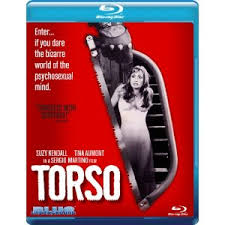
TORSO (I CORPI PRESENTANO TRACCE DI VIOLENCA CARNALE)
Italy, 1973, 94 minutes, Colour.
Suzy Kendall, Tina Aumont, Luc Merenda, John Richardson.
Directed by Sergio Martino.
Torso is a horror mystery thriller, a film about psychosexuality. The setting is Rome, a mysterious killer strangling students – the killer has a red and black scarf. The film focuses on the killer, the murders, the investigation.
The film was directed by Sergio Martino who had a thirty-year career directing rather exploitative and sensationalist films like Island of the Fishmen. However, he also directed An Australian in Rome with Nicole Kidman.
The film is the popular type of spaghetti horror prevalent at this time, especially influenced by the films of Dario Argento.
1. This film as an example of the genre of Italian thrillers, with overtones of sex and violence, and mystery? How good an example?
2. Was it a valuable plot, characterization? Or was it slightly deviant, sick?
3. The film's quality as entertainment? Its values about human life and character? Audience expectations from title and style? Did it exploit its material?
4. How convincing was the plot, characterizations? How contrived were they? Especially the psychological atmosphere, the hints for the killer, the doll flashback and its explanation?
5. The quality of the setting? The credits and the threats and murders? The art atmosphere, world of the students, relationships, sexuality, sordid atmosphere, parties and blackmail, violence? The Italian background and the overseas students?
6. How credible were the murders? The spying of the killer? Strangling? Hacking them to pieces?
7. How well did the film provide a range of suspects? Appropriate clues, for example the scarf, Danny and her memory?
8. The focus of the film on Jane as heroine? How interesting and engaging a heroine? Danny and her girl friends? As victims, characters, exploiters? The relationship between Danny a two friends and their sexuality?
9. The contribution of Stefania and his pursuit of Danny, as a murder suspect, his mad obsession, death? The blackmailer and his being run down? The variety of deaths?
10. The importance of the mountainous setting, the big house, Jane's injury, the preparation for her being threatened?
11. How effective was the day of terror for Jane as she hid in the house? Watch the killer bury the dead, wait for the doctor, try to signal for help etc.?
12. How satisfying was the explanation of why the killings were done? Did it make sense psychologically?
13. The fight between the Doctor and the Professor as an appropriate climax? Going over the cliff?
14. The quality of the scares and the mystery? The values? Was it a worthwhile film?
Published in Movie Reviews
Published in
Movie Reviews
Tagged under
Saturday, 18 September 2021 19:28
Torch Song

TORCH SONG
US, 1953, Colour.
Joan Crawford, Michael Wilding, Marjorie Rambeau, Gig Young, Harry Morgan, Dorothy Patrick.
Directed by Charles Walters.
An interesting serious musical. It was also the first colour film for Joan Crawford. Almost 50 at this stage, she had had a career in musicals, comedies and romances. She had also achieved a reputation for portraying strong vigorous heroines both on the good side of the law and against it. A strong big woman, she had a powerful presence and portrayed fierce women, often having a veneer over great vulnerability.
She brings this kind of performance to a role of a Broadway star living in isolation, being very demanding, giving herself completely to her audience. She is challenged by a blind pianist, played somewhat blandly by Michael Wilding. Joan Crayford, however, is charge of the melodramatics and it is certainly a Crawford vehicle. Marjorie Rambeau portrays her mother and received an Oscar nomination for this role. The director in Charles Waters, the director of many musicals from Easter Parade to Lili to High Society. A choreographer, he is also in charge of the dances. The musical numbers are enjoyable, but it is the dramatic melodramatics which count.
1. How interesting and enjoyable a musical, drama? How well did these two styles blend?
2. The appeal of the musical. the appeal of the theatre story, the appeal of the character study, melodrama? The story of a woman? Audience interest in the fifties, Joan Crawford? Now?
3. The contribution of colour, New York atmosphere? The world of the theatre and its atmosphere? The music the theme Tenderly, the songs? The dubbing of Joan Crawford's voice? The focus of the title?
4. The film's complete focus on Jenny? The introduction to her, the Broadway play, her career and its importance, her dancing? The rehearsal? The sudden eruption of her tantrums, her anger? The way that she treated people? Her arrogance? The fear basis? Jenny as the role made famous by Joan Crawford? The particular Crawford qualities brought to this interpretation?
5. How well portrayed was the character of Jenny? Her love of the theatre, her complete dedication to the audience and her statements about it? Her perfectionism and obsession? The admiration of her co-stars? The dancer who was not successful? Her relationship with Denner and his ignoring her tantrums but doing her will? The alcoholic producer whom she insulted? Her controlling the music, reaction to the pianist? Her ability to confront people, take the initiative, fire them? The sequences of her many arguments?
6. The contrast with her loneliness, as dramatised by the rehearsal of her lines with her secretary, her learning her lines in the bedroom and the evidence of her loneliness? Her charm to her fans, her parties and her irascible moods and throwing people out? Her wanting to do everything herself, taking charge of the fittings and the style of her dresses for example? Her relationship with her family? Paying their bills? Her being understanding with her secretary? A complicated character?
7. The support from Willard? Her almost owning him paying his bills, having him around, liking him, having him at parties, getting his support? The nice sponging man-around-town lacking character?
8. The introduction of Ty Graham? Michael Wilding's British style? The realization that he was blind, his playing the piano, his critique of her work as well as knowledge of it? Their working well together? Her confronting him, getting Denner to fire him. the confrontation in the restaurant? Her liking to talk to him and be with him without her realizing it? Their various arguments? Her trying out his musical arrangement and liking it? How well did the film present Ty as a character - his presentation of himself, background, war injuries and blindness, the guide dog? The demands that Jenny made on him, visiting his flat and the glimpse of him playing music with his friends? His response to her and idealizing her? His moving away from her, refusing to go to her party? Her greater realization of her dependence? Her hurting him especially as regards the dog, Martha? The confrontation between the two and her return to his apartment?
9. The character sketch of Jenny's mother, her incessant chatter, explanation of her background, intuitive understanding of Jenny? Her sister and the bills to be paid, the coat? Jenny and her memories? The sharing of memories with her mother, the scrapbook? The finding out who Ty really was and his love and devotion to her?
10. The melodramatics of the confrontation, Jenny breaking and Ty breaking? His facade going and the possibility of the two of them helping each other? The genuineness of their love?
11. Jenny's future as actress, woman?
12. The use of the musical themes especially Tenderly during the credits, the number of times it was played? The theme and its relationship to the character of Jenny?
13. How interesting a study of human nature, men-women relationships? The theatre, career, loneliness, ruthlessness? Fear and its facades?
Published in Movie Reviews
Published in
Movie Reviews
Tagged under
Saturday, 18 September 2021 19:28
Top Secret Affair
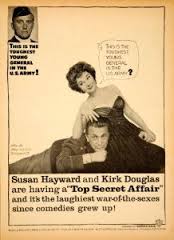
TOP SECRET AFFAIR
US, 1957, 100 minutes, Black and white.
Susan Hayward, Kirk Douglas, Paul Stewart, Jim Backus, John Cromwell, Roland Winters.
Directed by H.C. Potter.
Top Secret Affair has a subject which is still topical. Susan Hayward portrays the head of a media empire who determines to blacken the reputation of a military general, played by Kirk Douglas. With comic touches, this is a battle of the sexes as well as a media battle. There are finally some romantic touches.
Susan Hayward was at the peak of her career, winning an Oscar for I Want To Live the following year. Kirk Douglas had made an impact with such films as Lust for Life at this time and appeared in Paths of Glory the same year as this film.
The film was directed by H.C. Potter, his last film. He had a twenty-year career directing with such films as The Farmer’s Daughter and Mr Blandings Builds His Dream House as significant comedies of the mid-1940s.
The film is made in black and white, has very strong performance and has some sharp wit. The film had been planned for Humphrey Bogart and Lauren Bacall but Bogarde had a terminal illness and Lauren Bacall withdrew from the film to look after her dying husband.
1 The tone of the title, its irony, indication of themes of love and the army and politics?
2. Quality of black and white photography, Washington locations, domestic comedy style?
3. The importance of the stars, the focus of the comedy, the interaction, their different styles, suitability for comedy?
4. Dottie as a typical American woman, the background of her family and her wealth, Peal Enterprises and her power, her toughness, her ruling those who worked for her, her emotions, the fact that she was unloved and always ‘Miss Peel’, her unscrupulous attitudes and behaviour in politics? How much sympathy for her, how much dislike for her, her tactics? Her decision to attack General Goodwin, especially during the newsreel screening?
5. Melville Goodwin, an American man, typical, his strengths, loyalty, the background of his army career, his control and his skill? The importance of the newsreel record, tough but with a background of emotionality? Sympathy for him because he was going to be victimized? Dislike of him because of his militaristic background?
6. The picture of American journalism, its power, half-truths, working on people’s reputation? Its exercise of power, phoning to Washington, Senate Investigations? Although the film was a light comedy, how realistic was the ugly side of this?
7. The film's focus on the interviews between Dottie and General Goodwin? The various verbal battles, the General and his skill at answering questions, balancing, enjoying the meals and the dancing and the singing? The ugliness of the photos being taken to frame him? Sympathy for his victimization? Dottle's sympathy during his song? How well did he deport himself during these tests?
8. The evening in the pool house and the effect on each of them? The General's anger and its change? Dottie and her drunkenness and her fall into the pool? The truth about their love? The light of the morning after and its effect on the General? The importance of the story about Yvette and her execution? The parallel with Dottie although the General did not realize it?
9. The motives for letting the magazine article through, her vindictive attitudes in publishing it? The effect on each?
10. How well presented was the Senate Inquiry? The harassing of the general, his strong interrogation with 'Yes' or ‘no’ answers? The story of the young Korean girl, the importance of the spy story, its exposition?
11. The Importance of Dottie’s apology, her conversation with Paul, her wanting to get out of it, her public announcement of the truth and its effect? People’s attitudes towards her at the end?
12. The contribution of the Generals, the Generals' aides, Phil, the Senate Investigator?
13. How credible was the happy ending? The future for each of them?
14. The success of this kind of comedy in male-female relationships, America, journalism, politics and the army?
Published in Movie Reviews
Published in
Movie Reviews
Tagged under
Saturday, 18 September 2021 19:28
Topkapi
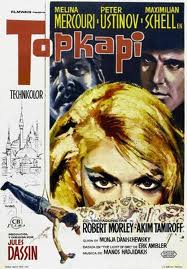
TOPKAPI
US, 1964, 119 minutes, Colour.
Melina Mercouri, Peter Ustinov, Maximilian Schell, Robert Morley, Akim Tamiroff.
Directed by Jules Dassin.
Topkapi is an enjoyable heist movie – made at the time of such films as The Pink Panther, anticipating the robbery series on television with their high technology.
The film was based on a novel by popular writer, Eric Ambler. It was directed by Jules Dassin who made a number of films in Hollywood, including Naked City, but was blacklisted in the early 50s and went to Europe. He made classic films there including Rififi, a French heist film of 1954 and, with his wife Melina Mercouri, Never on Sunday. He also directed the interesting version of Kazantsakis’ novel, He Who Must Die.
This is Dassin with the light touch. Again he is working with his wife. Maximilian Schell who had won an Oscar for Judgment at Nuremberg three years earlier is the central character, a conman who is challenged by a group of jewel thieves to steal a dagger from the Topkapi museum in Istanbul. Peter Ustinov won his second Oscar (the first for Spartacus in 1960) as a bumbling British crook. Robert Morley is also on hand for some comic touches and Akim Tamiroff as a cranky member of the group.
The film is beautiful in its use of Turkish settings. It is exciting in terms of the details of the robbery – being lowered from roofs, anticipating Tom Cruise in such films as Mission: Impossible, with this kind of suspense.
The film is witty in its dialogue, has excellent characterisations, and is a first-class entertainment.
1. This film is beginning to be considered a classic of entertainment? Popular ingredients?
2. The indication of the title and focus on Istanbul? The locations and the tour of Istanbul? how important for this film? The picture of the Turkish city, Turkish life, the harshness and glamour, the monuments and the sense of history, the duels? The museum and the detailed knowledge by the audience of the Museum? The film’s creation of atmosphere and its importance?
3. The film considered in the robbery genre? How successful? The details of the plan, the tongue in cheek approach, things going wrong, the skill in the execution, the fact that the criminals were caught, the irony throughout and in the ending? The films capacity for suspense, interest, the humour with Arthur Simpson as the substitute?
4. How successful was the film as comedy? The satire on the various types? Melina Mercuri, Peter Ustinov, Robert Morley?
5. How did the opening set the tone of the film? The presentation of the jewel? Elizabeth’s fascination and the dynamism of her character? Gathering together the criminals and the satiric way in which they were presented? Did the film follow this up well?
6. The focus of attention on Elizabeth, the character, her motivations, her vitality, her shrewdness in executing the plan? Cajoling Walter? Her joy and zest and person? Her fascination with the details? Her control of the characters? Her interest in the wrestling? The use of her laugh during the robbery? How well developed was her
character in the film?
7. Walter as a hero? his skill in plans and in his job? Relationship with Elizabeth? Control of the other characters? Ingenuity?
8. The humour in Cedric Page? The introduction via his toys, his skill, his pompous character, the satire on the English? Giulio and his role in the robbery? His skill, yet his final mistake? The contrast with Fischer?
9. How important was Arthur Slageon for the success of the film? The skill of Peter Ustinov’s comedy, the presentation as a guide adapting to visitors? his being a chauffeur, getting caught, caught in the double agent net, his capacity for telling stories? The humour of his being taken into the plan? His fear of heights? The collaboration? How developed a character was he?
11. The picture of the Turkish police? Comedy or serious? The emphasis on espionage? (the humour of Gaven and his babbling about ages and mistaken identities)? The visual presentation of ingenuity, delaying the police at the wrestling match, the use of the searchlights, the roof? Suspense?
12. The irony of their being caught? The humour of the plans for Moscow, how successful a robbery comedy?
Published in Movie Reviews
Published in
Movie Reviews
Tagged under
Saturday, 18 September 2021 19:28
Top Hat
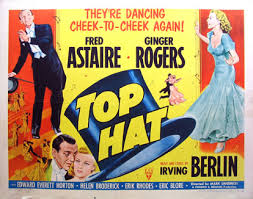
TOP HAT
US, 1935, 101 minutes, Black and white.
Fred Astaire, Ginger Rogers, Edward Everett Horton, Eric Blore, Erik Rhodes, Helen Broderick.
Directed by Mark Sandrich.
Top Hat was a very popular teaming of Fred Astaire and Ginger Rogers in 1935 and was acclaimed as one of the best films of the year. It repeats the plot line and style - from Flying Down to Rio and The Gay Divorcee. It also has the same supporting stars, However there is an Irving Berlin score which was very popular. Enjoyable for those who followed the career of Astaire and Rogers and the development of the musical in the 1930s.
1. An Astaire- Rogers vehicle? The formula and its popularity in its time, now?
2. The development of the sound musical via Astaire and Rogers, popularity in the '30s, escapism during the Depression the presentation of a song and dance world, its reality and unreality, the emphasis on wealth?
3. The styles of the two stars? Acting, singing and especially dancing ? both tap-dancing and ballroom? The comic supports?
4. The world of the films with the sets, artificiality, stylised production numbers?
5. The contrivances of the plot, romance, mistaken identities, eventual marriage? The perennial popularity of these themes and their contrivance, American style?
6. Fred Astaire and his personality, the show business type, his bursting into song and dance, romance, pursuit of Dale? Ginger Rogers as Dale, her work as a model, her suspicions, attraction towards Jeff, taking refuge in Venice, the mistaken identities and the impulsive marriage, the irony of all being well? A happy romantic duo?
7. The comic style of E. Everett Horton as Horace? his double-take, the contrast with Fred Astaire? Marge and the humour of the dominating wife? The conventional comic routines?
8. Bates and the English butler comedy routines and their enjoyment? Alberto and the poking fun at the proud Italian male?
9. How attractive were the songs and dances Top Hat, The Continental, Cheek to Cheek, The Weather etc.?
10. The Hollywood version of good and bad, right and wrong of the 1930s? The light touch for the times? The influence on later musical comedies?
Published in Movie Reviews
Published in
Movie Reviews
Tagged under